
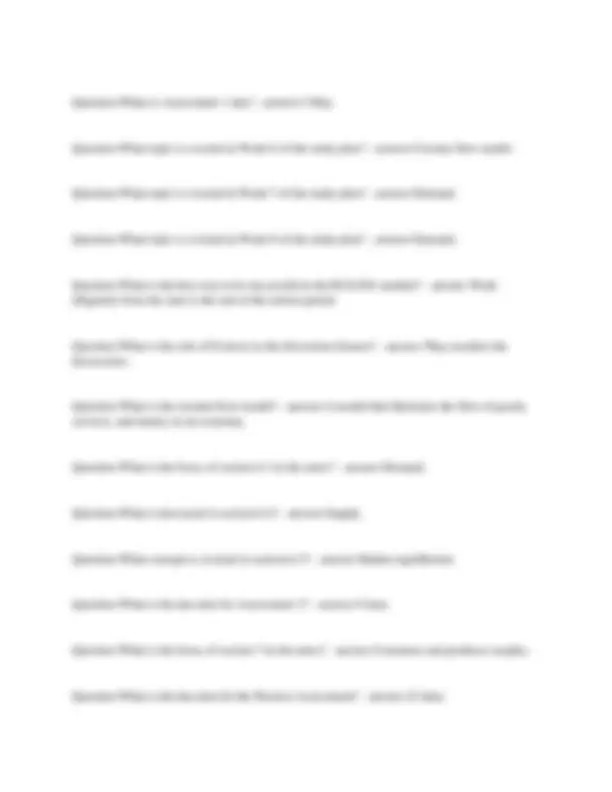
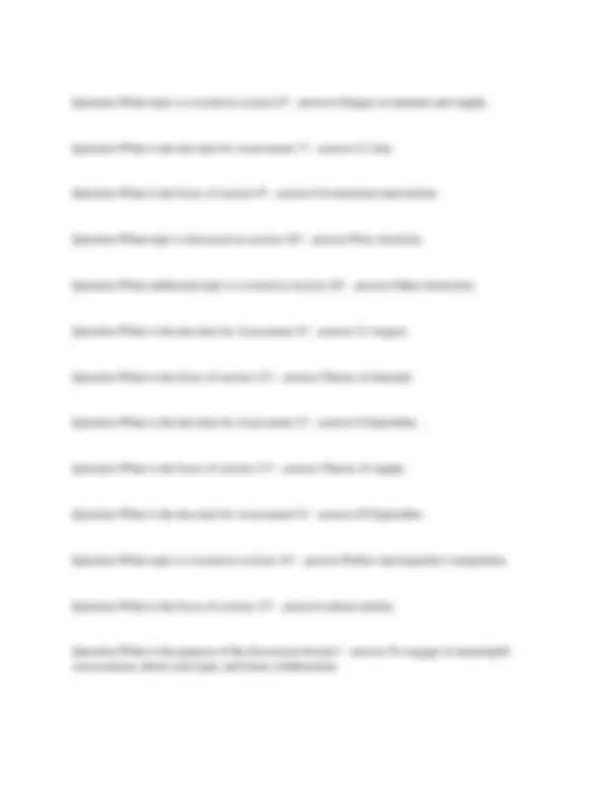
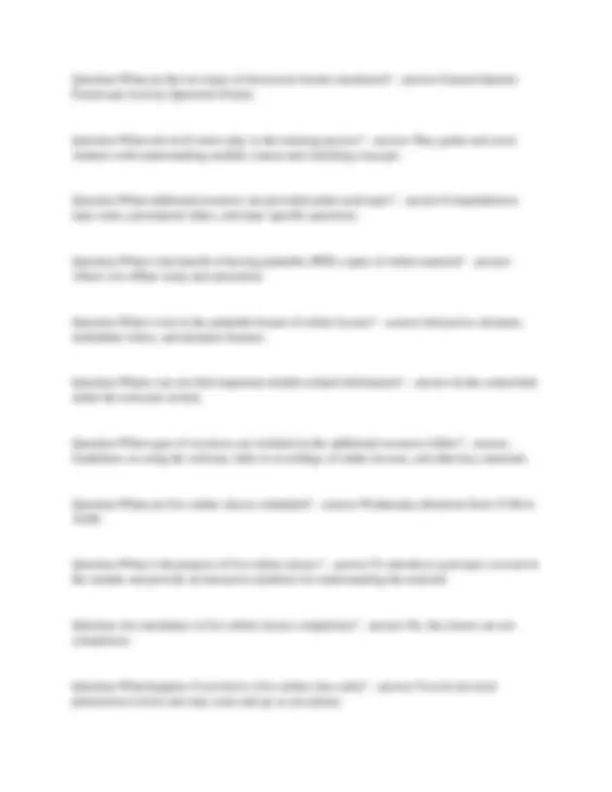
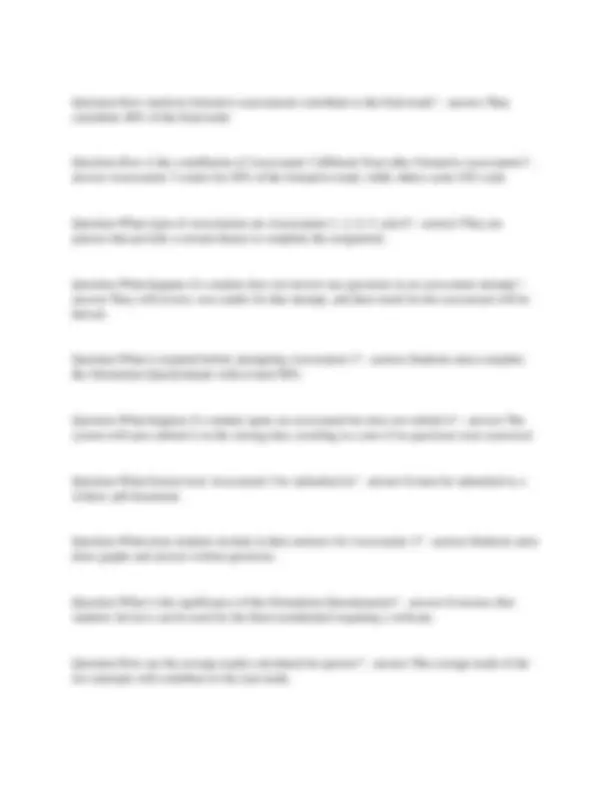
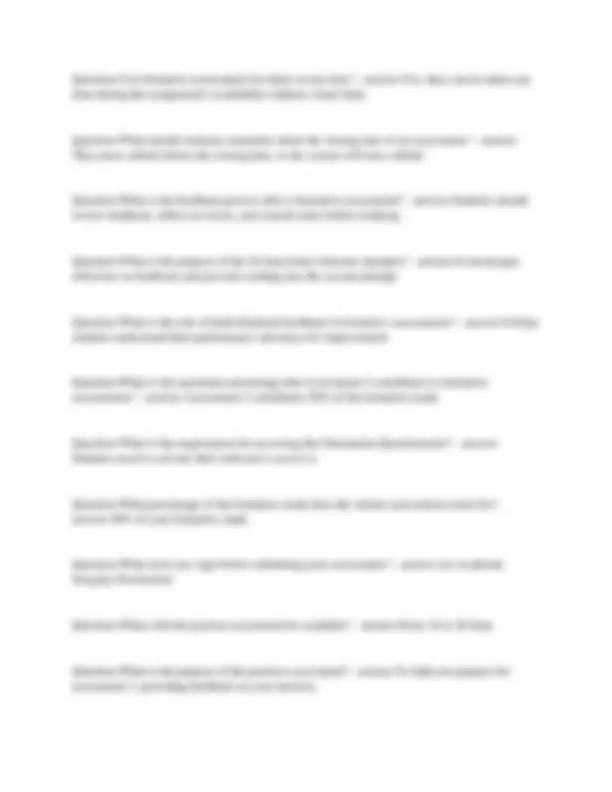
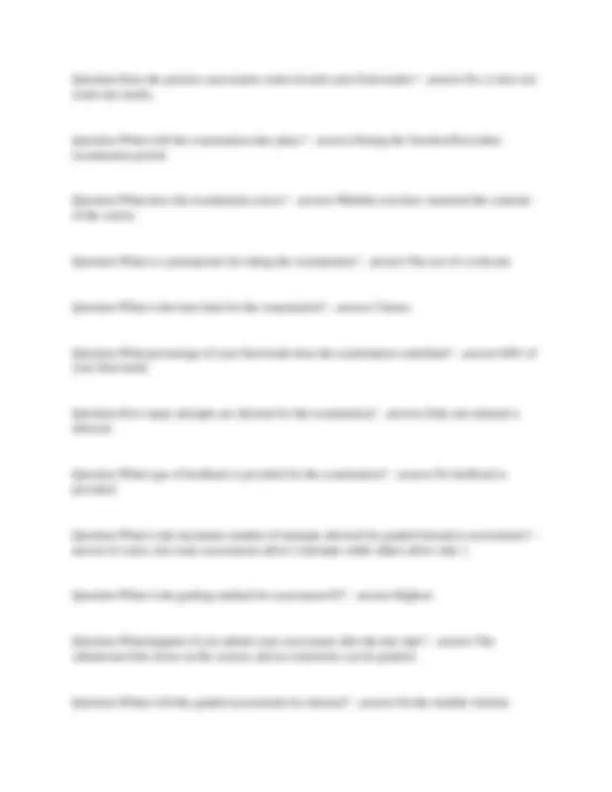
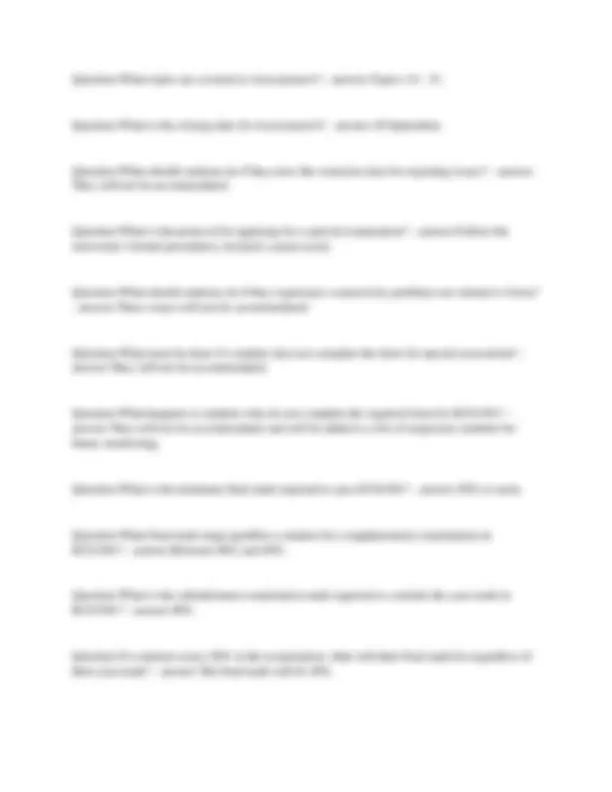
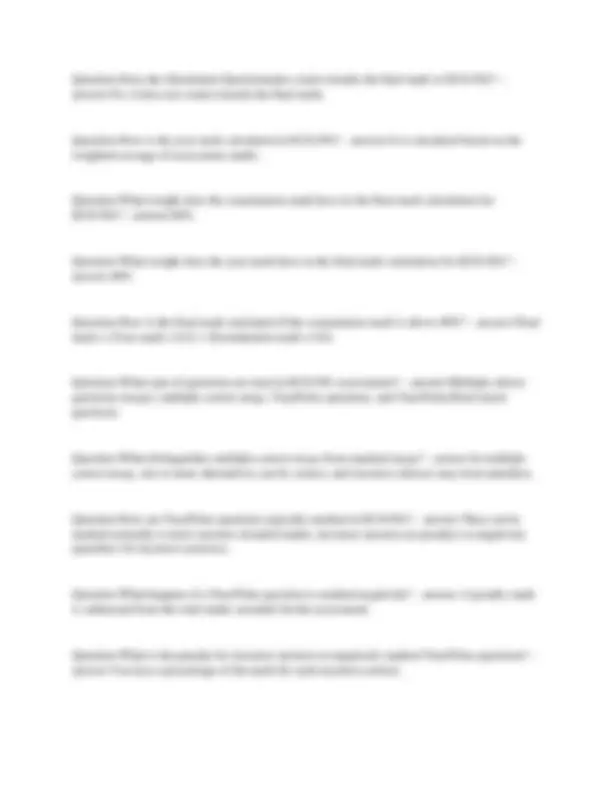
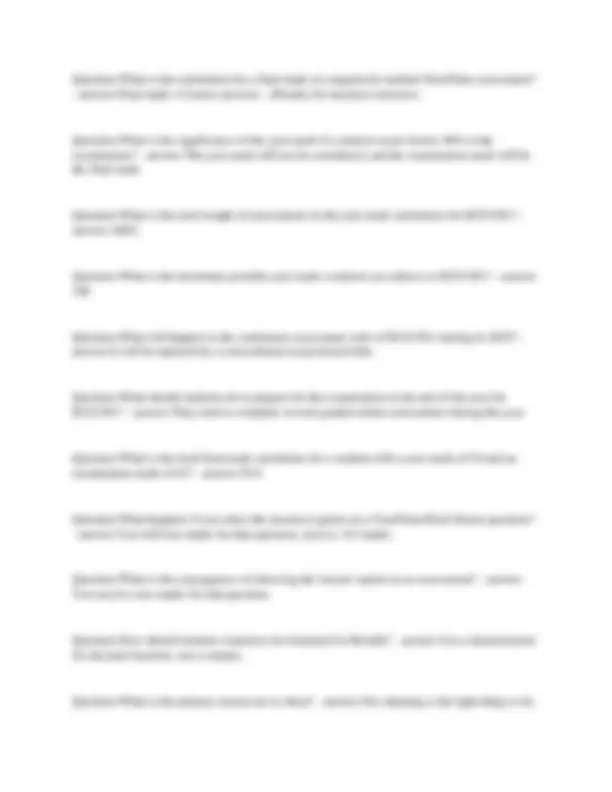


Study with the several resources on Docsity

Earn points by helping other students or get them with a premium plan


Prepare for your exams
Study with the several resources on Docsity

Earn points to download
Earn points by helping other students or get them with a premium plan
Community
Ask the community for help and clear up your study doubts
Discover the best universities in your country according to Docsity users
Free resources
Download our free guides on studying techniques, anxiety management strategies, and thesis advice from Docsity tutors
ECS1501LATEST EXAM WITH DETAILED QUESTIONS AND CORRECT ANSWERS GRADED A+.pdf
Typology: Exams
1 / 17

This page cannot be seen from the preview
Don't miss anything!










What percentage of the final mark is contributed by assessments in ECS1501? - answer-40%. Question-What percentage of the final mark is contributed by the examination in ECS1501? - answer-60%. Question-How many assessments are there in the ECS1501 course? - answer-6 assessments. Question-What is the minimum recommended study time for the ECS1501 module? - answer-At least 120 (notional) hours. Question-What skills are assumed for students taking ECS1501? - answer-Ability to draw and interpret simple graphs, perform basic arithmetic operations, and express oneself clearly in English. Question-How is the ECS1501 module content structured? - answer-It is divided into 15 topics. Question-What is the purpose of the activities (quizzes) in each topic? - answer-To test understanding and ability to apply knowledge, providing immediate feedback. Question-What types of questions are included in the quizzes for ECS1501? - answer-True/false, multiple-choice, fill in the missing word, numerical questions, and short written answers. Question-What should students do after completing lessons and activities for a topic? - answer- Complete the self-assessment checklist.
Question-What are the two types of discussion forums available for each topic? - answer-General Queries Forum and Activity Questions Forum. Price ceiling - answer-A legal maximum on the price at which a good can be sold Question-price floor - answer-A legal minimum on the price at which a good can be sold Question-Price ceiling impacts - answer-A persistent shortage (excess demand) develops. "Black Market" develops. Opportunities for corruption and bribery are created. Question-Price flooring impacts - answer-A persistent surplus develops. Consumers have to pay artificially high prices. Inefficient producers are protected and manage to survive. The disposal of the market surpluses usually entails further costs to tax payers and welfare losses to society. Question-price elasticity of demand - answer-the percentage change in quantity demanded divided by the corresponding percentage change in its price Question-What resources are included in the Additional Resources folder for each topic? - answer-Forum discussion activity questions, powerpoint slides, and topic notes. Question-What is the first task to complete in Week 1 of the study plan? - answer-Work through the Important Information document and the Start Here section on the module webpage. Question-What topic is covered in Week 2 of the study plan? - answer-The study field of economics. Question-What topic is covered in Week 3 of the study plan? - answer-The economist's toolkit. Question-What topic is covered in Week 4 of the study plan? - answer-Economic systems. Question-What topic is covered in Week 5 of the study plan? - answer-Production possibilities curve.
Question-What topic is covered in section 8? - answer-Changes in demand and supply. Question-What is the due date for Assessment 3? - answer-21 July. Question-What is the focus of section 9? - answer-Government intervention. Question-What topic is discussed in section 10? - answer-Price elasticity. Question-What additional topic is covered in section 10? - answer-Other elasticities. Question-What is the due date for Assessment 4? - answer-12 August. Question-What is the focus of section 12? - answer-Theory of demand. Question-What is the due date for Assessment 5? - answer-8 September. Question-What is the focus of section 13? - answer-Theory of supply. Question-What is the due date for Assessment 6? - answer-29 September. Question-What topic is covered in section 14? - answer-Perfect and imperfect competition. Question-What is the focus of section 15? - answer-Labour market. Question-What is the purpose of the discussion forums? - answer-To engage in meaningful conversations about each topic and foster collaboration.
Question-What are the two types of discussion forums mentioned? - answer-General Queries Forum and Activity Questions Forum. Question-What role do E-tutors play in the learning process? - answer-They guide and assist students with understanding module content and clarifying concepts. Question-What additional resources are provided under each topic? - answer-Comprehensive topic notes, powerpoint slides, and topic-specific questions. Question-What is the benefit of having printable (PDF) copies of online material? - answer- Allows for offline study and annotation. Question-What is lost in the printable format of online lessons? - answer-Interactive elements, embedded videos, and dynamic features. Question-Where can you find important module-related information? - answer-In the central hub under the welcome section. Question-What types of resources are included in the additional resources folder? - answer- Guidelines on using the webcam, links to recordings of online lessons, and other key materials. Question-When are live online classes scheduled? - answer-Wednesday afternoon from 15:00 to 16:00. Question-What is the purpose of live online classes? - answer-To introduce each topic covered in the module and provide an interactive platform for understanding the material. Question-Are attendance at live online classes compulsory? - answer-No, the classes are not compulsory. Question-What happens if you leave a live online class early? - answer-You do not need permission to leave and may come and go as you please.
Question-What does the examination preparation session focus on? - answer-Preparing students for the upcoming examination. Question-What is the significance of formative assessments for students? - answer-They provide an opportunity to apply learned concepts and improve understanding based on feedback. Question-What is the main goal of summative assessments? - answer-To assess whether learning outcomes or skills have been mastered. Question-What type of assessment is the examination classified as? - answer-Summative assessment. Question-What is the benefit of formative assessments being non-graded? - answer-They allow students to focus on learning without the pressure of grades. Question-What are non-graded formative assessments in this module? - answer-They include online activities, discussion forum questions, and self-assessment quizzes. Question-What is the purpose of summative assessments? - answer-To assess whether you have mastered the skills/outcomes of the content, typically through an exam. Question-How do formative assessments assist students? - answer-They aim to help achieve specific outcomes by working through prescribed material and making notes. Question-What is the time policy for formative assessments in this module? - answer-Formative assessments are not timed, allowing students to refer back to notes and materials. Question-What should students do after submitting a formative assessment? - answer-Review the feedback, understand mistakes, and consult notes before attempting the assessment again. Question-What is the time delay between the first and second attempts of a formative assessment? - answer-A 24-hour time delay is set between the first and second attempts.
Question-How much do formative assessments contribute to the final mark? - answer-They contribute 40% of the final mark. Question-How is the contribution of Assessment 3 different from other formative assessments? - answer-Assessment 3 counts for 50% of the formative mark, while others count 10% each. Question-What types of assessments are Assessments 1, 2, 4, 5, and 6? - answer-They are quizzes that provide a second chance to complete the assignment. Question-What happens if a student does not answer any questions in an assessment attempt? - answer-They will receive zero marks for that attempt, and their mark for the assessment will be halved. Question-What is required before attempting Assessment 1? - answer-Students must complete the Orientation Questionnaire with at least 90%. Question-What happens if a student opens an assessment but does not submit it? - answer-The system will auto-submit it on the closing date, resulting in a zero if no questions were answered. Question-What format must Assessment 3 be submitted in? - answer-It must be submitted as a written .pdf document. Question-What must students include in their answers for Assessment 3? - answer-Students must draw graphs and answer written questions. Question-What is the significance of the Orientation Questionnaire? - answer-It ensures that students' devices can be used for the final examination requiring a webcam. Question-How are the average marks calculated for quizzes? - answer-The average mark of the two attempts will contribute to the year mark.
Question-Does the practice assessment count towards your final marks? - answer-No, it does not count any marks. Question-When will the examination take place? - answer-During the October/November examination period. Question-What does the examination assess? - answer-Whether you have mastered the contents of the course. Question-What is a prerequisite for taking the examination? - answer-The use of a webcam. Question-What is the time limit for the examination? - answer-2 hours. Question-What percentage of your final mark does the examination contribute? - answer-60% of your final mark. Question-How many attempts are allowed for the examination? - answer-Only one attempt is allowed. Question-What type of feedback is provided for the examination? - answer-No feedback is provided. Question-What is the maximum number of attempts allowed for graded formative assessments? - answer-It varies, but some assessments allow 2 attempts while others allow only 1. Question-What is the grading method for assessment 03? - answer-Highest. Question-What happens if you submit your assessment after the due date? - answer-The submission link closes on the system, and no extensions can be granted. Question-Where will the graded assessments be released? - answer-On the module website.
Question-Can you submit your answers using a mark-reading sheet? - answer-No, you cannot submit using a mark-reading sheet. Question-What should you ensure before starting the examination? - answer-That you have studied the required topics and are prepared. Question-What is the time delay between attempts for formative assessments? - answer-1 day. Question-What is the grading method for assessments 01, 02, 04, 05, and 06? - answer-Average. Question-What is the format for submitting graded assessments? - answer-They can only be submitted online. Question-What are the dates for Assessment 1 covering Topics 1 - 4? - answer-Available on 21 April, closing on 5 May at 11:00 PM. Question-What topics are covered in the Practice Assessment? - answer-Topics 5 - 8. Question-When is the closing date for the Practice Assessment? - answer-23 June at 11:00 PM. Question-What is the procedure if a student misses a formative assessment? - answer-Students must apply for a special assessment within 10 days of the closing date with valid proof. Question-What types of valid reasons are accepted for missing an assessment? - answer-Death in the immediate family, military/SAPS service, or illness on the due date. Question-What must be submitted as proof for missing an assessment? - answer-A doctor's note, proof of hospitalization, or call-up instructions.
Question-What topics are covered in Assessment 6? - answer-Topics 14 - 15. Question-What is the closing date for Assessment 6? - answer-29 September. Question-What should students do if they miss the extension date for reporting issues? - answer- They will not be accommodated. Question-What is the protocol for applying for a special examination? - answer-Follow the university's formal procedures; lecturers cannot assist. Question-What should students do if they experience connectivity problems not related to Unisa?
Question-Does the Orientation Questionnaire count towards the final mark in ECS1501? - answer-No, it does not count towards the final mark. Question-How is the year mark calculated in ECS1501? - answer-It is calculated based on the weighted average of assessment marks. Question-What weight does the examination mark have in the final mark calculation for ECS1501? - answer-60%. Question-What weight does the year mark have in the final mark calculation for ECS1501? - answer-40%. Question-How is the final mark calculated if the examination mark is above 40%? - answer-Final mark = (Year mark x 0.4) + (Examination mark x 0.6). Question-What type of questions are used in ECS1501 assessments? - answer-Multiple-choice questions (mcqs), multiple-correct mcqs, True/False questions, and True/False/Don't know questions. Question-What distinguishes multiple-correct mcqs from standard mcqs? - answer-In multiple- correct mcqs, one or more alternatives can be correct, and incorrect choices may incur penalties. Question-How are True/False questions typically marked in ECS1501? - answer-They can be marked normally (correct answers awarded marks, incorrect answers no penalty) or negatively (penalties for incorrect answers). Question-What happens if a True/False question is marked negatively? - answer-A penalty mark is subtracted from the total marks awarded for the assessment. Question-What is the penalty for incorrect answers in negatively marked True/False questions? - answer-You lose a percentage of the mark for each incorrect answer.
Question-What are some risks associated with cheating? - answer-Getting caught and facing disciplinary action, damaging your reputation, and missing essential knowledge. Question-How can cheating affect Unisa's reputation? - answer-It can damage the brand by making it known as 'the university where students cheat'. Question-What is defined as cheating or academic dishonesty? - answer-Any act that allows a student to gain or attempt to gain an unfair or undeserved learning advantage. Question-What behaviors are considered cheating according to the notes? - answer-Asking a tutor for help, sharing login details, submitting work on behalf of someone else, and sharing answers before an assignment closes. Question-What are some common excuses students give for cheating? - answer-Believing it's the only way to pass, peer pressure, inability to afford repeating the module, lack of preparation time, or not understanding the material. Question-What is Unisa's policy on cheating? - answer-Unisa has a zero tolerance policy for cheating. Question-What are the consequences of being caught cheating? - answer-You will receive zero marks for the assessment and may face disciplinary steps. Question-What happens if you do not respond to a cheating allegation within five working days?
Question-What should you do if you witness cheating? - answer-You should report cheating. Question-What is the significance of the phrase 'guilty by association' in the context of cheating?